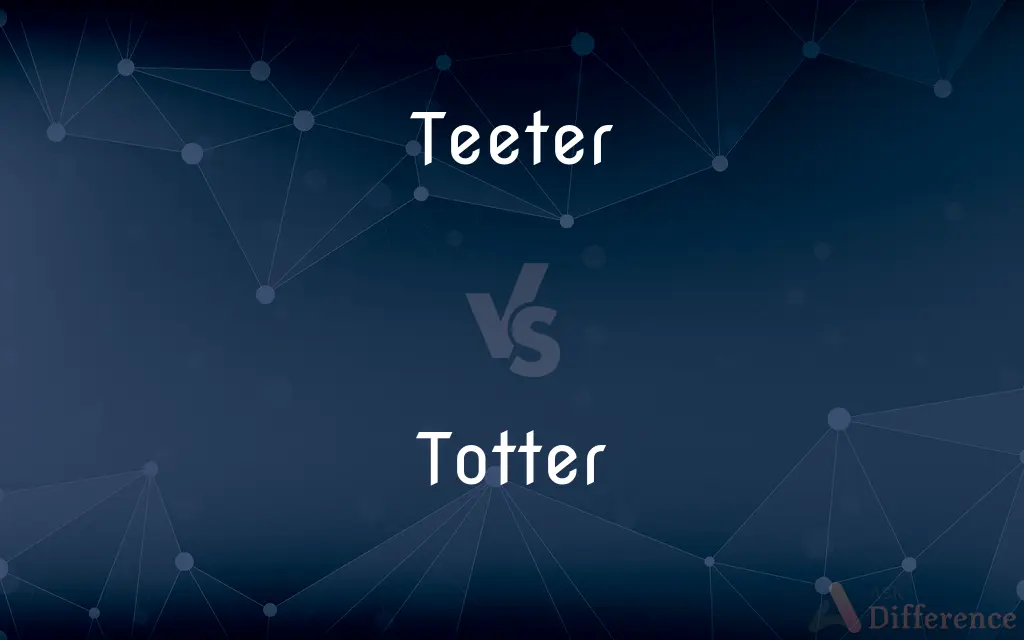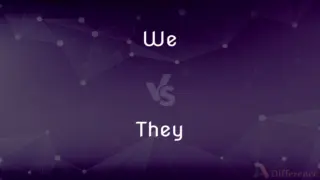Teeter vs. Totter — What's the Difference?
Edited by Tayyaba Rehman — By Maham Liaqat — Updated on April 30, 2024
Teeter and totter both describe a back-and-forth motion, but teeter often implies a precarious balancing act, whereas totter suggests unsteady, wobbly movement.

Difference Between Teeter and Totter
Table of Contents
ADVERTISEMENT
Key Differences
Teeter often describes a slight movement around a specific pivot point, suggesting a delicate balance, whereas totter refers to a shaky, unstable motion, as seen in the walk of a toddler.
Teeter is frequently used metaphorically to describe being on the verge of a particular state, such as failure or success, whereas totter can imply vulnerability due to weakness or old age.
In physical contexts, teeter can relate to objects balancing precariously, like a teeter-totter (or seesaw), whereas totter often describes the movement of a person or structure about to fall.
Teeter might be used in scenarios involving financial or emotional instability, indicating a critical point of balance, whereas totter often conveys a more gradual decline or deterioration.
When applied to movements, teeter suggests a controlled, albeit risky, balance, whereas totter implies a lack of control or coordination, enhancing the sense of risk.
ADVERTISEMENT
Comparison Chart
Primary Connotation
Precarious balancing, often around a pivot point
Unsteady, wobbly movement, especially due to weakness
Usage in Physical Context
Used to describe objects in a delicate balance (e.g., seesaw)
Often describes a person's unsteady movements
Metaphorical Use
Indicates a critical state of nearly losing balance
Suggests gradual decline or deterioration
Control Implication
Implies an element of control in balancing
Implies lack of control and coordination
Emotional/Mental Context
Used to describe being on the brink emotionally or financially
Used to describe weakness or fragility in physical appearance
Compare with Definitions
Teeter
To move unsteadily around a pivot point.
The vase teetered on the edge of the shelf.
Totter
To walk or move with shaky steps.
The toddler tottered across the room.
Teeter
To balance precariously on the brink of a state or condition.
The company teetered on the brink of bankruptcy.
Totter
To move or proceed in a feeble or unsteady way.
The injured bird tottered on the edge of the roof.
Teeter
To sway back and forth as if about to fall.
He teetered after spinning around in circles.
Totter
To be unstable or insecure.
The economy tottered during the crisis.
Teeter
To be in an uncertain situation.
The negotiations teetered between success and failure.
Totter
To shake or tremble.
The table tottered under the weight of the books.
Teeter
To wobble or oscillate in a small range.
The balance beam made her teeter as she walked.
Totter
To sway as if about to fall.
Teeter
Move or balance unsteadily; sway back and forth
She teetered after him in her high-heeled sandals
Totter
To appear about to collapse
An empire that had begun to totter.
Teeter
To move or sway unsteadily or unsurely; totter.
Totter
To walk unsteadily or feebly; stagger.
Teeter
To alternate, as between opposing attitudes or positions; vacillate.
Totter
The act or condition of tottering.
Teeter
To be close to or in danger of failure or ruin
The housing market teetered on the edge of collapse.
Totter
To walk, move or stand unsteadily or falteringly; threatening to fall.
The baby tottered from the table to the chair.
The old man tottered out of the pub into the street.
The car tottered on the edge of the cliff.
Teeter
See seesaw.
Totter
(figurative) To be on the brink of collapse.
Teeter
(intransitive) To tilt back and forth on an edge.
He teetered on the brink of the precipice.
Totter
(archaic) To collect junk or scrap.
Teeter
(figuratively) To be indecisive.
We teetered on the fence about buying getaway tickets and missed the opportunity.
Totter
An unsteady movement or gait.
Teeter
(figuratively) To be close to becoming a typically negative situation.
Despite appearances, the firm was teetering on the edge of bankruptcy.
Totter
(archaic) A rag and bone man.
Teeter
(North America) A teeter-totter or seesaw.
Totter
To shake so as to threaten a fall; to vacillate; to be unsteady; to stagger; as, an old man totters with age.
Teeter
To move up and down on the ends of a balanced plank, or the like, as children do for sport; to seesaw; to titter; to titter-totter.
[The bobolink] alit upon the flower, and teetered up and down.
Totter
To shake; to reel; to lean; to waver.
Troy nods from high, and totters to her fall.
Teeter
Move unsteadily, with a rocking motion
Totter
Move without being stable, as if threatening to fall;
The drunk man tottered over to our table
Totter
Walk unsteadily;
Small children toddle
Totter
Move unsteadily, with a rocking motion
Common Curiosities
Does totter imply progress or movement?
Totter implies a form of progress or movement but suggests that it is done so in an unstable and precarious manner.
How do teeter and totter relate to age or maturity?
Totter is often used for the elderly or very young, reflecting physical instability, whereas teeter does not imply any age-specific usage.
Can teeter and totter be used interchangeably?
They can be used similarly in some contexts but usually have distinct nuances concerning balance and stability.
Which term is more commonly used in a physical context?
Totter is more commonly used to describe physical movements of people or objects.
What type of movements does teeter describe?
Teeter typically describes movements where there's a fine balance and a risk of falling to one side, often around a central pivot.
What is the primary difference between teeter and totter?
Teeter involves delicate balancing, often metaphorically, while totter refers to shaky, unsteady movements.
Is there a scenario where only one of the terms should be used?
Yes, teeter is more appropriate for describing financial or emotional states, while totter is better for physical instability.
Can totter be used metaphorically?
Yes, totter can be used metaphorically to describe anything that is in a state of decline or instability, like an economy or relationship.
Are there specific industries or fields where teeter is more prevalent?
Teeter is commonly used in discussions about finance and economics to describe volatile conditions.
Is totter always related to movement by people?
While often associated with unsteady walking, particularly of toddlers or the elderly, totter can also describe the motion of inanimate objects like buildings or furniture.
In what contexts might teeter appear outside physical movements?
Teeter is often used in financial, emotional, or situational contexts, like teetering on the edge of a decision or state.
Can teeter have a positive connotation?
Teeter can occasionally have a positive spin when it suggests a thrilling or exciting balance, such as in a risky yet potentially rewarding venture.
What imagery might one associate with teeter?
Imagery associated with teeter might include a seesaw or a tightrope walker, highlighting the balance aspect.
Are there specific industries or fields where totter is more prevalent?
Totter is less industry-specific but can be found in discussions about health, particularly geriatrics, and early childhood development.
What imagery might one associate with totter?
Imagery for totter could include a crumbling building or a staggering person, emphasizing the precariousness of the motion.
Share Your Discovery

Previous Comparison
Auxin vs. Gibberellin
Next Comparison
We vs. TheyAuthor Spotlight
Written by
Maham LiaqatEdited by
Tayyaba RehmanTayyaba Rehman is a distinguished writer, currently serving as a primary contributor to askdifference.com. As a researcher in semantics and etymology, Tayyaba's passion for the complexity of languages and their distinctions has found a perfect home on the platform. Tayyaba delves into the intricacies of language, distinguishing between commonly confused words and phrases, thereby providing clarity for readers worldwide.
















































